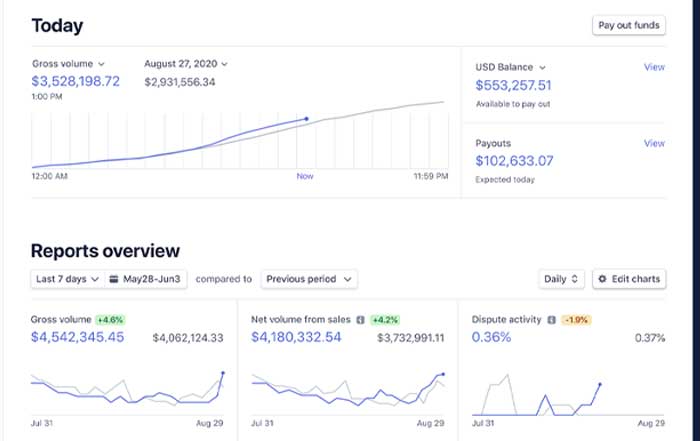The fintech industry has experienced exponential growth over the past decade, driven by the integration of technology into financial services. This transformation has led to the emergence of numerous companies that are reshaping the way consumers and businesses engage with financial products. Among these, several fintech companies have made significant strides and are now publicly traded on US stock exchanges. This article delves into some of the biggest fintech companies listed in the United States, examining their market positions, innovations, and contributions to the financial landscape. Fintech includes everything from mobile banking applications and digital payment platforms to blockchain technology and robo-advisors. The fintech sector has disrupted traditional banking models, offering consumers more accessible, efficient, and cost-effective alternatives to conventional financial services. As of 2024, the fintech market is valued at approximately four trillion dollars, underscoring its significance in the global economy.
Key Characteristics of Fintech Companies
Fintech companies typically share several key characteristics:
- Innovation: These companies are often at the forefront of technological advancements, utilizing artificial intelligence, machine learning, and blockchain to improve financial services.
- User-Centric Design: Many fintech solutions prioritize user experience, offering intuitive interfaces and seamless integration with existing financial systems.
- Accessibility: Fintech companies aim to democratize financial services, making them available to a broader audience, including underserved populations.
- Regulatory Adaptation: Navigating the complex regulatory landscape is crucial for fintech companies, as they must comply with financial regulations while innovating.
Prominent Fintech Companies Listed on US Stock Exchanges
Visa is one of the largest payment processing networks globally, facilitating electronic funds transfers through its vast network of merchants and financial institutions. With a market capitalization exceeding $546 billion, Visa plays a critical role in the fintech ecosystem by enabling secure and efficient payment solutions. The company's commitment to innovation is evident in its investments in blockchain technology and digital currencies, positioning it as a leader in the evolving landscape of financial services.
2. Mastercard Incorporated (MA)
Similar to Visa, Mastercard is a global leader in payment technology, boasting a market capitalization of approximately $446 billion. The company offers a wide range of payment solutions, including contactless payments and digital wallets. Mastercard has also been proactive in integrating advanced technologies such as artificial intelligence to enhance fraud detection and improve customer experiences. Its strategic partnerships with fintech startups further solidify its position as a key player in the industry.
Formerly known as Square, Block has emerged as a significant force in the fintech sector, particularly in the realm of digital payments and cryptocurrency. With a market capitalization around $30 billion, Block has expanded its services to include Cash App, a platform that allows users to send and receive money easily, and Square's point-of-sale systems for businesses. The company's focus on inclusivity and innovation has made it a favorite among small businesses and individual users alike.
4. PayPal Holdings, Inc. (PYPL)
PayPal is a pioneer in the digital payments space, with a market cap of approximately $90 billion. The platform enables consumers to make online payments securely and efficiently, and it has expanded its services to include Venmo, a popular peer-to-peer payment app. PayPal's commitment to innovation is evident in its recent foray into cryptocurrency, allowing users to buy, hold, and sell digital assets directly through its platform. This strategic move has positioned PayPal as a key player in the evolving landscape of digital finance.
5. Robinhood Markets, Inc. (HOOD)
Robinhood has revolutionized the investment landscape by offering commission-free trading and a user-friendly mobile app. With a market capitalization of around $8 billion, the company has attracted millions of users, particularly among younger investors. Robinhood's innovative approach to trading has democratized access to financial markets, enabling individuals to invest in stocks, ETFs, and cryptocurrencies without the barriers typically associated with traditional brokerage firms.
6. SoFi Technologies, Inc. (SOFI)
SoFi, or Social Finance, is a comprehensive financial services platform that offers a range of products, including student and personal loans, mortgage refinancing, and investment services. With a market cap of approximately $6 billion, SoFi has positioned itself as a one-stop-shop for consumers seeking financial solutions. The company's emphasis on technology-driven services and user experience has resonated with a diverse customer base, particularly millennials and Gen Z.
7. Affirm Holdings, Inc. (AFRM)
Affirm is a leading player in the buy now, pay later (BNPL) space, providing consumers with flexible payment options for online purchases. With a market capitalization of around $5 billion, Affirm has partnered with numerous retailers to offer its services at checkout, allowing customers to split their purchases into manageable installments. The company's innovative approach to consumer financing has gained significant traction, particularly during the rise of e-commerce.
Chime is a neobank that has gained popularity for its no-fee banking services and user-friendly mobile app. Although not publicly traded, Chime's valuation has soared to approximately $25 billion, making it one of the most valuable fintech startups in the US. The company's focus on financial inclusion and transparency has resonated with consumers, particularly those who are underserved by traditional banks. Chime's innovative approach to banking has positioned it as a significant disruptor in the financial services sector.
9. Stripe, Inc.
Stripe is a technology company that provides payment processing solutions for online businesses. While not publicly traded, its valuation has reached $95 billion, reflecting its dominance in the e-commerce payment space. Stripe's suite of tools enables businesses to accept payments, manage subscriptions, and prevent fraud, making it an essential partner for many startups and established companies alike. The company's commitment to innovation and user experience has solidified its position as a leader in the fintech industry.
10. Coinbase Global, Inc. (COIN)
As one of the largest cryptocurrency exchanges in the world, Coinbase has played a pivotal role in the mainstream adoption of digital currencies. With a market capitalization of approximately $10 billion, Coinbase provides a platform for users to buy, sell, and store various cryptocurrencies. The company's focus on security and regulatory compliance has helped it gain the trust of millions of users, making it a key player in the evolving landscape of digital finance.
Prominent Fintech Companies Timeline
Visa Inc. (V)
Market Cap: $546B+
Global payment processing network
Mastercard Inc. (MA)
Market Cap: $446B
Global leader in payment technology
Block, Inc. (SQ)
Market Cap: $30B
Digital payments and cryptocurrency
PayPal Holdings, Inc. (PYPL)
Market Cap: $90B
Pioneer in digital payments
Robinhood Markets, Inc. (HOOD)
Market Cap: $8B
Commission-free trading platform
SoFi Technologies, Inc. (SOFI)
Market Cap: $6B
Comprehensive financial services platform
Affirm Holdings, Inc. (AFRM)
Market Cap: $5B
Buy now, pay later services
Coinbase Global, Inc. (COIN)
Market Cap: $10B
Largest cryptocurrency exchange
The Future of Fintech
The future of fintech is poised for continued growth and innovation, driven by advancements in technology and changing consumer preferences. As more individuals and businesses embrace digital financial solutions, the demand for fintech services is expected to rise. Key trends shaping the future of the industry include:
1. Increased Adoption of Artificial Intelligence
Artificial intelligence (AI) is set to play a transformative role in the fintech sector, enhancing everything from customer service to fraud detection. Companies are increasingly leveraging AI to analyze vast amounts of data, enabling them to offer personalized financial solutions and improve operational efficiency.
2. Growth of Decentralized Finance (DeFi)
Decentralized finance, or DeFi, is gaining traction as an alternative to traditional financial systems. By leveraging blockchain technology, DeFi platforms enable users to engage in financial transactions without intermediaries, offering greater transparency and lower costs. This trend is likely to reshape the financial landscape, providing consumers with more control over their financial assets.
3. Expansion of Cryptocurrency Services
As cryptocurrencies gain mainstream acceptance, fintech companies are likely to expand their offerings to include a wider range of digital assets. This includes not only trading platforms but also services related to digital wallets, lending, and investment in cryptocurrencies.
4. Enhanced Regulatory Compliance
As the fintech industry continues to grow, regulatory scrutiny is expected to increase. Companies will need to adapt to evolving regulations while ensuring compliance to maintain consumer trust and protect against fraud. This will require a proactive approach to risk management and regulatory adaptation.
5. Focus on Financial Inclusion
Fintech companies are increasingly prioritizing financial inclusion, aiming to provide services to underserved populations. This includes developing solutions that cater to individuals without traditional banking access, thereby promoting economic empowerment and social equity.
Conclusion
The fintech landscape is characterized by rapid innovation and transformation, with numerous companies leading the charge in reshaping financial services. From established giants like Visa and Mastercard to emerging players like Robinhood and Affirm, the industry is diverse and dynamic. As technology continues to evolve, the potential for fintech to drive further changes in the financial sector remains immense. Investors and consumers alike should keep a close eye on this sector, as it offers exciting opportunities for growth and innovation in the years to come.










